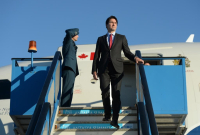Support strong Canadian climate journalism for 2025
AMMAN, Jordan — There is room for the federal government to expand its efforts to help train Kurdish forces battling the militants of the Islamic State of Iraq and the Levant, Canada's ambassador to Iraq says.
While the Kurds want the ongoing special forces training to continue, they are asking for help in other areas, Bruno Saccomani said Tuesday in an interview with The Canadian Press from his home base in Jordan.
"Something that I'm very proud that they are asking for is police and firefighter training, which is something Canada can do," Saccomani said.
Whether that's what Canada will do is up to the government to decide, he hastened to add.
Prime Minister Justin Trudeau said last month that Canada will increase the number of ground troops it has in Iraq in order to help train local forces, but hasn't said what specific role those troops will play.
"I've committed repeatedly to my allies that we were going to do more on the training front and that means obviously more than just 69 trainers," Trudeau said while travelling to the Philippines for a summit in November.
"How many that will be, what form that will take, what kind of engagement we're going to have, those are things that we're going to work out."
Canadian soldiers played a leading role in the training of Afghan police during that war. The experience has repeatedly been cited as a template for future military operations.
Saccomani said resources in Iraqi Kurdistan are being stretched thin due to the demands of the 1.5 million displaced people currently in the region.
A mix of Sunni and Shia Muslims, as well as Christians, all thrown together in tight quarters creates a challenge, he added. "The community policing part of it might be something Canada would be able to do quite nicely."
When The Canadian Press asked the ambassador other questions about the ongoing campaign against ISIL, Global Affairs staff who were on hand said the questions were "outside the scope" of the interview and Saccomani did not answer them.
While Saccomani represents Canada's interests in Iraq, he is also the ambassador to Jordan.
He arrived in 2013, the same time as hundreds of thousands of Syrians began fleeing into Jordan to escape the civil war in their country.
That summer, the Conservatives announced a small program to help Syrian refugees, opening up 1,300 spots for resettlement.
When asked whether Canada should have done more in 2013, Saccomani said the situation was in such flux that the efforts at the time — providing funds and support for humanitarian and logistical aid to refugees and the countries hosting them — was just what was needed, under the circumstances.
"If you're sitting in a wind tunnel somewhere and there's no other elements disturbing you but the wind, it's easy to make these assumptions," he said.
"But given the reality and the unpredictable nature of the conflicts that we were being faced with and the terrorist organizations that were percolating all of this, Canada did absolutely the right thing."
Neither the Syrians nor the Jordanians ever thought the crisis would extend as long as it did, he said, and now that it has, people have begun looking for other kinds of help.
Canada's offer of resettlement for 25,000 Syrians by the end of February is just one example.
Operations are ramping up at the processing facility the Canadian government launched this week in Amman for refugee cases from Jordan — over 100 people went through the system on Monday and Tuesday, Saccomani said.
Problems with the electronic infrastructure in the facility have been fixed and all the biometrics equipment is now operational, he added.
He couldn't say when the first plane load of people would depart, but the year-end target to resettle nearly half of the 25,000 remains.
"We have been asked by the government to deliver 10,000 (from the region) by the end of December," he said.
"And I have no intention (of) failing."
Stephanie Levitz, The Canadian Press



Comments